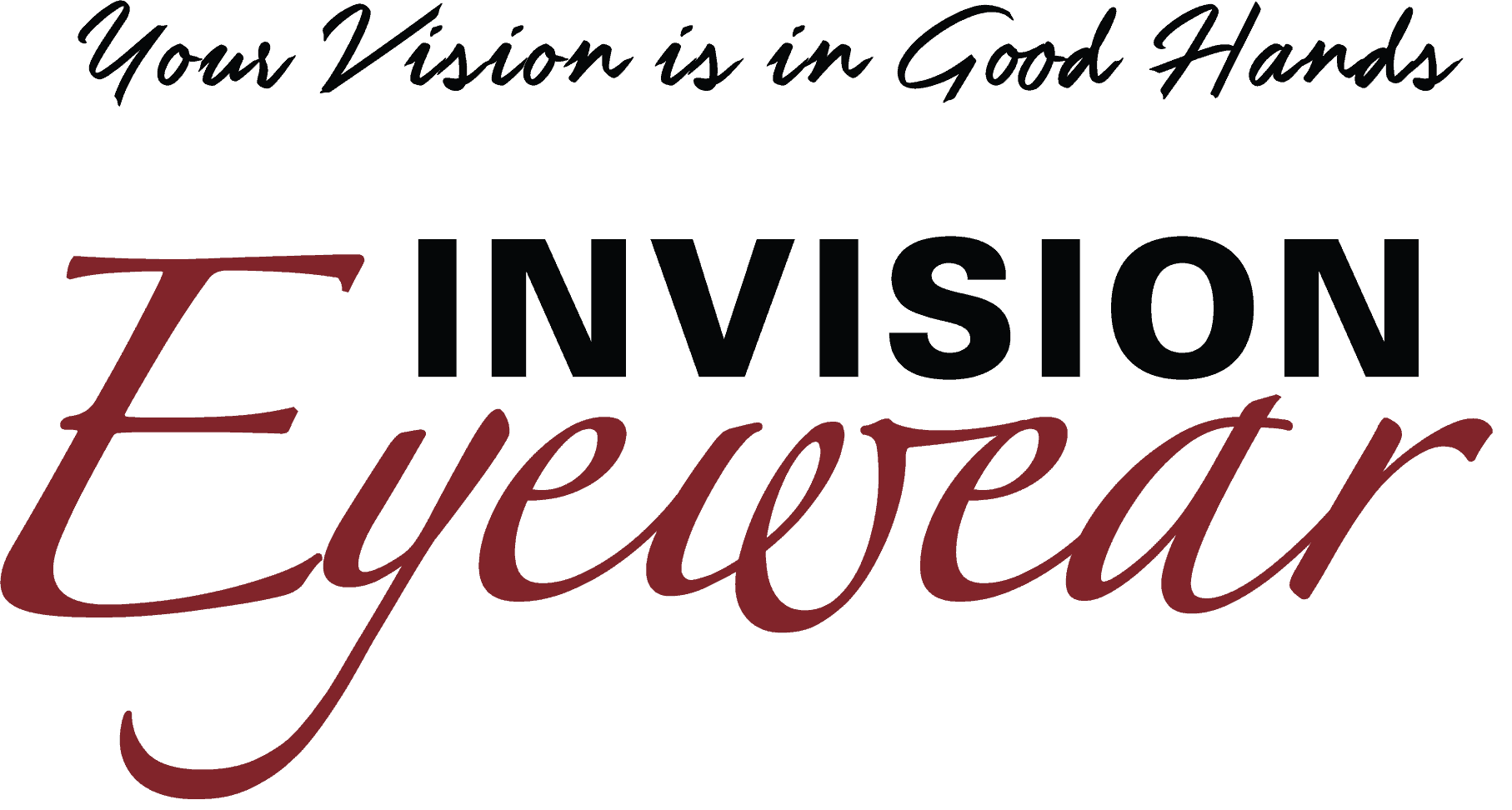INVISION EYEWEAR
Located in Oak Park Mall (lower level)
11477 W 95th St, Overland Park, KS 66214
INVISION EYEWEAR
Located in Oak Park Mall (lower level)
Blue Light Blocking Glasses: Everything You Need to Know
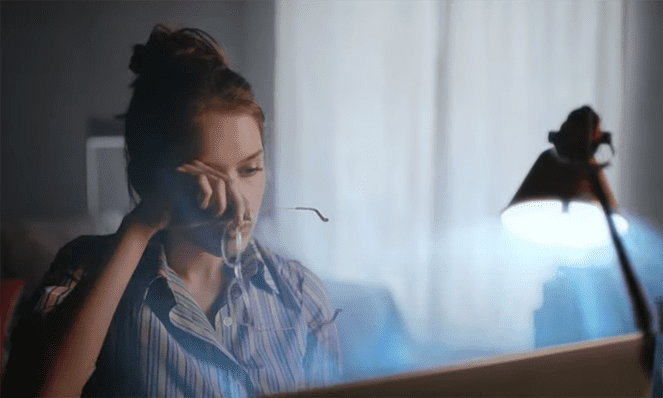
Do you ever find yourself feeling exhausted after using your computer or phone? Or maybe you’ve been having trouble falling asleep at night? If so, blue light might be to blame. Blue light is electromagnetic radiation from digital devices and artificial lights. While it’s not always harmful, too much blue light can cause eye fatigue and even sleeplessness. That’s where blue-light-blocking glasses come in. They help reduce the amount of blue light that enters your eyes, which can help improve your energy level and sleep quality. Keep reading to learn everything you need to know about blue-light-blocking glasses!
What is blue light?
Blue light is visible light emitted by artificial light sources like fluorescent light bulbs and electronic screens, such as computers, laptops, smartphones, and TVs. Blue light has a shorter wavelength and scatters more quickly than other visible light colors, producing more energy. It is also a type of high-energy visible (HEV) light. HEV light is linked to digital eye strain caused by exposure to the blue-violet end of the visible spectrum from electronic screens.
Symptoms of digital eye strain include tired eyes, headaches, and neck and shoulder pain. Wearing blue light glasses while using digital devices can help reduce these symptoms by blocking some of the blue light that causes eye strain. Additionally, blue light exposure can disrupt your circadian rhythm and your body’s natural sleep-wake cycle.
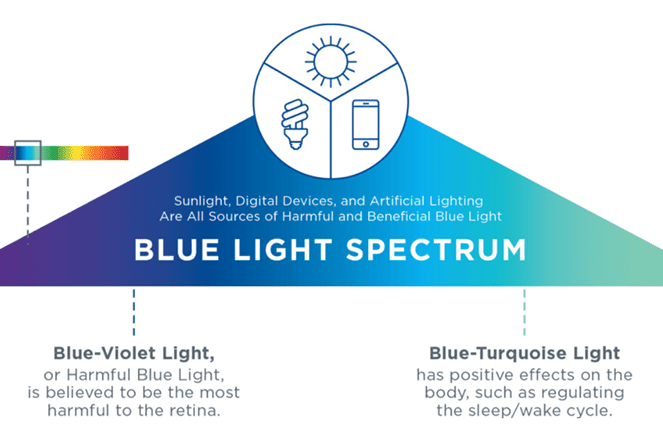
According to recent studies, blue light exposure at night can cause insomnia and make it difficult to fall asleep. A review published in 2019 in the Journal of Biological and Medical Rhythm Research found that individuals exposed to blue light at night took longer to fall asleep. They also experienced less deep sleep. The study also found that exposure to blue light increased waking up at night.
Another study conducted by Harvard Medical School found that blue light exposure suppressed melatonin production. This hormone regulates the sleep cycle. The Harvard study found that individuals exposed to blue light at night had more difficulty falling asleep and felt more tired during the day. In addition, the study found that blue light exposure can dry out the eyes and make it difficult to blink. These studies suggest that blue light exposure at night can negatively affect sleep.
LED lights are found in many electronic devices and emit blue light that can harm your eyes. This blue light can disrupt your internal clock and sleep patterns, causing you to feel less sleepy at night and more tired during the day. It can also cause blurry vision and difficulty focusing.
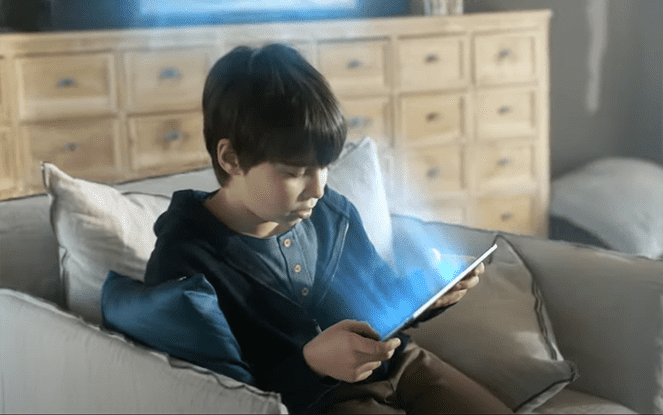
Additionally, exposure to blue light before bed can make it harder to fall asleep and reduce your sleep quality.
Luckily, you can do a few things to protect your eyes from LED lights. First, limit exposure to LED lights by turning off electronics at least an hour before bed. Second, wear blue-light-blocking glasses or use a screen filter on your devices. And finally, make sure to take breaks every 20 minutes or so to give your eyes a rest. Following these simple tips can help reduce the harmful effects of LED lights on your eyesight.
What are blue-light-blocking glasses?
Blue-light-blocking glasses are designed to reduce the amount of blue light that enters your eyes. They have a special coating that helps reflect blue light away from your eyes. Blue-light-blocking glasses are sometimes called “blue blockers” or “computer glasses.”
How do blue-light-blocking glasses work?
Do blue light glasses really work? The short answer is yes! Blue light glasses help to reduce the amount of blue light that enters your eyes by filtering out blue light before it reaches your eyes. The blue-light-blocking coating helps reflect blue light away from your eyes, which reduces the amount of blue light that enters your eyes. If you’re looking for an easy way to reduce blue light exposure, blue light glasses are a great option! Blue light glasses are a great way to reduce eye strain and improve sleep quality.
Why use blue-light-blocking reading glasses?
There are a few reasons why you might want to wear blue light-blocking reading glasses. First, you may be exposed to too much blue light if you spend a lot of time looking at screens, such as computers, laptops, and smartphones. Wearing blue light-blocking reading glasses can help reduce the amount of blue light that enters your eyes. They may also help reduce symptoms of digital eye strain.
So, what exactly are the benefits of blue-light-blocking glasses? Here are a few key points:
- Blue light-blocking glasses can help to reduce screen time-related eye fatigue and strain.
- Blue light has been linked to several adverse health effects, including sleep disturbance and digital eye strain.
- Wearing blue-light-blocking glasses can help protect your eyes from the harmful effects of blue light exposure.
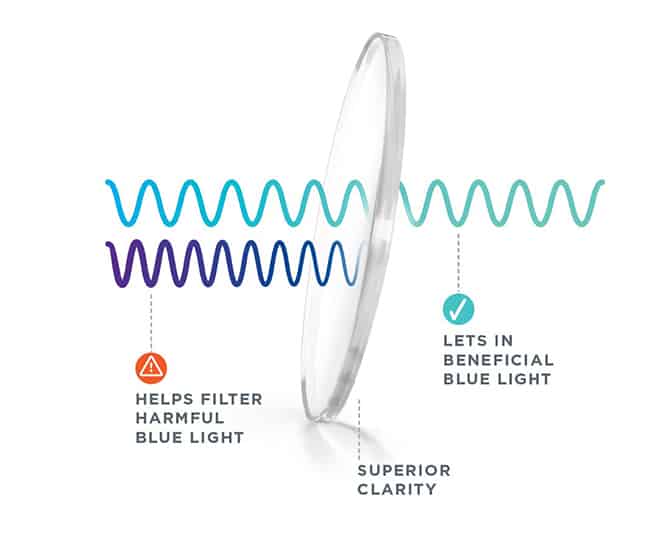
Why use blue-light-blocking reading glasses?
How to reduce eye fatigue from screens
People are constantly on their screens for work, school, or pleasure, leading to eye fatigue and strain. To help reduce eye fatigue from screens, here are a few tips:
Check the brightness of your screen. The brighter your screen, the more strain it will put on your eyes. If you can, adjust the brightness of your screen to match the light in your environment.
Take breaks often. Eye breaks will give your eyes a chance to rest and refocus. Every 20 minutes or so, look away from your screen for at least 20 seconds.
Invest in a pair of blue-light-blocking glasses. Blue light from screens can cause eye fatigue and even disrupt your sleep cycle. Wearing amber-tinted lenses can help filter out blue light and reduce eye strain.
Get an eye exam. Suppose you find that you’re still experiencing eye fatigue after making changes to your screen time habits. In that case, getting an eye exam is a good idea.
What blue light glasses work?
Polarized lenses
One essential feature to look for in a pair of blue light-blocking glasses. Polarized lenses help to reduce glare and make it easier to see in bright light. They also provide UV Protection, vital for reducing eye fatigue and protecting your eyes from the sun’s harmful rays.
Anti-reflective coated lenses
Anti-reflective coatings are another critical feature in a pair of blue light-blocking glasses. These coatings help reduce the amount of blue light reflected back into your eyes from your computer screen. Most blue light-blocking glasses also have a tinted lens. The tint color can vary, but common choices include amber, orange, and yellow.
The tint on blue light-blocking glasses helps to reduce the amount of blue light that passes through the lens and into your eyes. Amber tints are the most common tint used in blue light-blocking glasses. Amber tints help to block blue light while still allowing you to see clearly.
Wearing blue light-blocking glasses with an orange or yellow tint can help to reduce your exposure to blue light. Orange hues and yellow shades are also effective at reducing blue light exposure. However, these tints may make it more challenging to see in lowlight conditions. Tints can also help to reduce eye fatigue by reducing the bright light that enters your eyes.
Polycarbonate lenses
What blue light glasses work?
So, what are the best blue light-blocking glasses? The best glasses for you will depend on your needs and preferences. If you work long hours on a computer, you may want to choose a pair with polarized lenses and an anti-reflective coating. If you are sensitive to blue light, you may want to choose a pair with a darker tint. This can help to reduce the amount of eye fatigue you experience when reading for long periods. Whatever your needs, a pair of blue light-blocking glasses are right for you.

Conclusion
In conclusion, blue light-blocking glasses are a great way to reduce eye fatigue and strain. They can also help to protect your eyes from the harmful blue light spectrum. Polycarbonate lenses are an excellent option for durable and 100% UV protection lenses. Felix Gray Turing Glasses are perfect for those who want amber-tinted lenses that block blue light waves. Whatever your needs, a pair of blue light-blocking glasses are right for you.
Many options are available on the market if you are looking for blue light-blocking glasses. The best blue light-blocking glasses for you will depend on your needs and preferences. If you work long hours on a computer, you may want to choose a pair with polarized lenses and an anti-reflective coating.
If you are sensitive to blue light, you may want to choose a pair with a darker tint. Whatever your needs, a pair of blue light-blocking glasses are right for you. We offer a variety of styles to choose from, so you can find the perfect pair of blue light-blocking glasses for your needs. Thanks for reading.
